|
|
Canku Ota |
|
|
(Many Paths) |
||
|
An Online Newsletter Celebrating Native America |
||
|
November 29, 2003 - Issue 101 |
||
|
|
||
|
"The Big Empty" Is Big Fun in a Small Package |
||
|
Film Review by Deanna Brady
|
||
|
Cast: Jon Favreau, Rachael Leigh Cook, Kelsey Grammer, Joey Lauren Adams, Adam Beach, Sean Bean, Daryl Hannah, Bud Cort, Gary Farmer One thing can be said for certain about The Big Empty, an offbeat independent feature that premiered at the AFI FEST 2003 in Hollywood this month: It's good fun. Among the most popular films at the festival, it achieved a sold-out house for the event (in one of the ArcLight complex's largest theaters), which included a Q & A session with first-time feature filmmaker Steve Anderson. In addition to directing several plays in New York, director-writer Anderson has been a cameraman for CNN and other news agencies and has shot seven documentaries for PBS. He wrote this script after covering the infamous "Heaven's Gate" case in San Diego. The Big Empty is a darkly comic film that might easily become something of a cult classic. A loving homage to both film noir and pulp sci-fi, it has a certain mad but friendly quality -- a cozy, affable core around which swirl all manner of twisted and tweaked collateral elements. These form the type of odd amalgam one might achieve after stirring together pinches of Twin Peaks, It Came From Outer Space, Roswell, The Big Sleep, Fargo, and Mayberry RFD. The central figure of The Big Empty is a self-absorbed but likable out-of-work actor played by Jon Favreau (who executive-produced the film and also directed the recent comedy release Elf). Working as a delivery man and hoping for a Hollywood miracle, John Person is alternately insecure and self-contained and unflappable ... as only a marginally employed thespian could be. Seemingly rootless in Los Angeles, John is one of the thousands of geographic transplants holding down minimum-wage jobs while praying for the breaks that will finally establish their nearly nonexistent acting careers. His one true friend appears to be Grace (Joey Lauren Adams), the lovely young woman from across the hall in his apartment building who obviously cares deeply about him -- a fact to which he seems nearly oblivious.
John first balks at the strange request, but after viewing the thorough dossier Neely has compiled and contemplating being evicted for nonpayment of rent, he reluctantly agrees. He insists on a reasonable advance so that Grace can pay the landlord for him. Then, armed with a pistol Neely has forced on him, he heads for "the big empty" (otherwise known as Shoshone/Mohave/Chemehuevi country). John makes his way to isolated Baker, California (modestly legendary home of The World's Largest Thermometer and the Original Bun Boy), seeking the enigmatic stranger he's been instructed to meet. He arrives at the seedy Royal Hawaiian Motel and is greeted by the planet's creepiest clerk since Norman Bates, a geek called Elron (John Gries) -- possibly after L. Ron Hubbard? -- who has a metal plate in his head and a habit of leaving Twinkies on the bed pillows instead of mints.
In the midst of this mix appear two well-known and beloved First Nations actors, one of whom is playing an ethnically nonspecific role, and the other the somewhat shopworn"Indian mystic," in a singularly bent rendition. The first of these two is the endearing and inarguably hunky Adam Beach (Dog Creek Lake Anishinaabe Saulteaux), who in this instance plays the psychopathically jealous and abusive boyfriend of a relentlessly seductive town hottie named Ruthie (Rachael Leigh Cook). Anderson says that he was interested in using Beach after seeing him in Smoke Signals and other recent films and enjoying his performances. This one lends even greater variety to Beach's growing filmography, and he paints it with multicolored layers. It's greatly to Anderson's credit that he considered Beach strictly as an appropriate talent when casting this role, without regard to ethnicity. As it turns out, it was nothing short of wise that he chose Beach to play the role of Randy, who might otherwise have seemed too heavy and menacing or predictable and melodramatic a character for the rest of the piece if cast more to type. Beach's wholesome good looks, sunny smile, and cheerful demeanor make an inherently loathsome character not only palatable but attractive ... yet he plays it convincingly enough that his slowly revealed transition to violence feels seamless and not entirely unexpected.
Anderson was also aware of Farmer's work before casting The Big Empty and had admired his abilities. His role may actually have been a later addition to the cast (he isn't yet credited in several movie databases), and he seems to be there principally to move the plot around at the end. This he does quite handily, giving depth and dimension to a minor character that might otherwise have been simply expository and ultimately forgettable. This performance is yet another in his long list of unique and memorable characterizations and, although smaller than some, does nothing to tarnish his already sterling reputation as one of the most interesting actors in Indian Country. The notable cast also includes Daryl Hannah as the earnest and principled bar proprietor and Kelsey Grammer as an over-the-top, fiercely confident federal agent who shows up to question John after Neely turns up dead and headless back in L. A. This development makes John more than a little uncomfortable, especially since he's recently received an anonymous blue bowling bag by way of Elron, with instructions from the ever-elusive Cowboy not to open it. When he finally appears, Sean Bean makes a handsomely menacing figure as Cowboy and rounds out a collection of uniformly strong and capable performances.
In the end, this charmingly mismatched collection of constituent parts adds up to a uniquely stylized and heartfelt film that is likely to become at least a guilty pleasure, if not an instant favorite. Whichever way those chips may fall, it will certainly help to support and promote the careers of talented Native performers, both now and into the future. Artisan Entertainment is set to release The Big Empty in select theaters November 21. Regarding the very successful AFI FEST 2003, it was worrying to note that there were no representative American Indian/First Nations films on the roster. According to a festival programmer, not many were submitted this year. However, AFI reviewers not only indicate a willingness to welcome and consider such projects but are quite anxious to view new work from Indian Country during their deliberation process in the future. |
|
|
||
|
|
||
| Canku Ota is a free Newsletter celebrating Native America, its traditions and accomplishments . We do not provide subscriber or visitor names to anyone. Some articles presented in Canku Ota may contain copyright material. We have received appropriate permissions for republishing any articles. Material appearing here is distributed without profit or monetary gain to those who have expressed an interest. This is in accordance with Title 17 U.S.C. Section 107. | ||
|
Canku Ota is a copyright © 2000, 2001, 2002, 2003 of Vicki Lockard and Paul Barry. |
||
 |
 |
|
|
The "Canku Ota - A Newsletter Celebrating Native America" web site and its design is the |
||
|
Copyright © 1999, 2000, 2001, 2002, 2003 of Paul C. Barry. |
||
|
All Rights Reserved. |
||
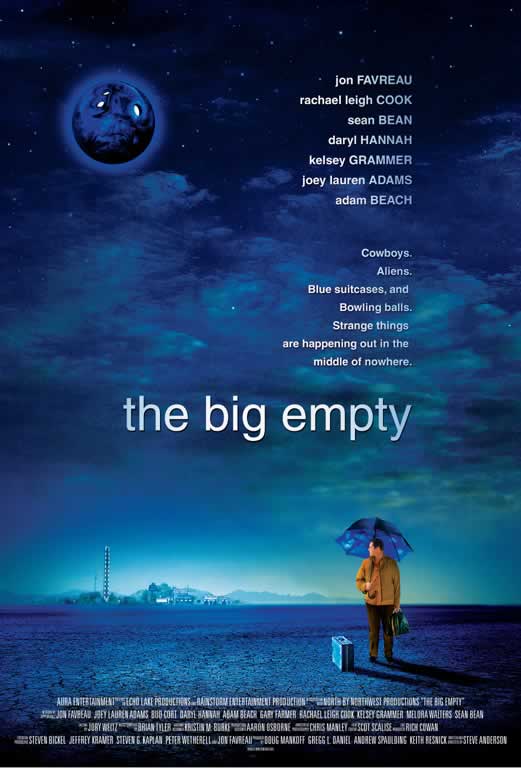 THE
BIG EMPTY
THE
BIG EMPTY 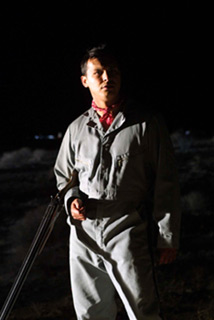 John
has been fretting about his serious financial straits when his eccentric
neighbor Neely shows up unannounced. At this point, the only remaining
personal belongings in John's apartment seem to be his glossy publicity
photos, which he tapes methodically in a row on an otherwise naked
wall. The wild-eyed Neely (played with wonderful weirdness by the
wonderfully weird Bud Cort) somehow knows all about John's situation
and his most personal secrets. He tells John that if he will immediately
drive out to the Mojave desert and deliver a locked blue suitcase
to a purported tough guy identified only as Cowboy, he will earn
$25,000 for his efforts (an amount that will just about cover his
current debts).
John
has been fretting about his serious financial straits when his eccentric
neighbor Neely shows up unannounced. At this point, the only remaining
personal belongings in John's apartment seem to be his glossy publicity
photos, which he tapes methodically in a row on an otherwise naked
wall. The wild-eyed Neely (played with wonderful weirdness by the
wonderfully weird Bud Cort) somehow knows all about John's situation
and his most personal secrets. He tells John that if he will immediately
drive out to the Mojave desert and deliver a locked blue suitcase
to a purported tough guy identified only as Cowboy, he will earn
$25,000 for his efforts (an amount that will just about cover his
current debts).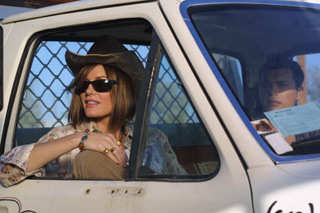 When
John learns that he's missed an apparently angry Cowboy by minutes,
he hits the local bar and begins to encounter as strange a collection
of desert rats as one might imagine would live at the edge of the
"civilized" world. Not only are the denizens of this Gateway
to Death Valley a tad cracked, but many seem convinced that Baker
may actually be something of an interplanetary truck stop, as well
as a conventional one. As he waits for his contact to return, John
soon finds himself more and more entangled in the skewed lives of
the local misfits and sucked ever more deeply into what looks like
quite a bizarre and otherworldly mystery.
When
John learns that he's missed an apparently angry Cowboy by minutes,
he hits the local bar and begins to encounter as strange a collection
of desert rats as one might imagine would live at the edge of the
"civilized" world. Not only are the denizens of this Gateway
to Death Valley a tad cracked, but many seem convinced that Baker
may actually be something of an interplanetary truck stop, as well
as a conventional one. As he waits for his contact to return, John
soon finds himself more and more entangled in the skewed lives of
the local misfits and sucked ever more deeply into what looks like
quite a bizarre and otherworldly mystery.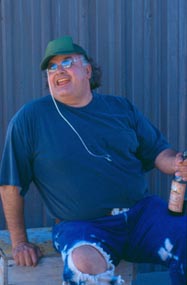 The
redoubtable Gary Farmer (Six Nations Cayuga) portrays the second
of these characters -- in this case identified as Indian Bob and
delivering lines that sound as inscrutable as stereotypical medicine-man
dialogue, but with tongue planted firmly in cheek and with an atypically
sardonic edge. This is a "shaman" under a floppy hat,
who perfunctorily relieves himself in John's presence in an ironically
comical but suspenseful closing sequence. A man who helps to arrange
for the transport of aliens through the Southern California desert,
Indian Bob can certainly be described as a coyote.
The
redoubtable Gary Farmer (Six Nations Cayuga) portrays the second
of these characters -- in this case identified as Indian Bob and
delivering lines that sound as inscrutable as stereotypical medicine-man
dialogue, but with tongue planted firmly in cheek and with an atypically
sardonic edge. This is a "shaman" under a floppy hat,
who perfunctorily relieves himself in John's presence in an ironically
comical but suspenseful closing sequence. A man who helps to arrange
for the transport of aliens through the Southern California desert,
Indian Bob can certainly be described as a coyote. 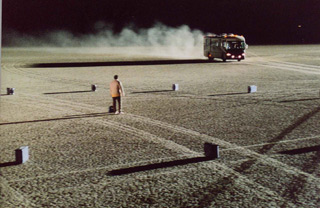 In
the film's pivotal role, Jon Favreau's amiable, matter-of-fact demeanor
provides an anchor around which the attendant loopiness revolves.
The relatively imperturbable character of John Person acts as a
sort of Everyman, guiding viewers through an unfamiliar landscape
populated by eccentric inhabitants and in which remarkable things
seem to happen in an oddly familiar way. The film's underlying supernatural
quality grows partly through the introduction of small changes,
such as hints of color that might easily go unnoticed consciously.
All the mystery finally culminates with stark graphic imagery on
an eerily beautiful dry lake bed, and it concludes in a resolution
that leaves the audience still curious but ultimately satisfied.
In
the film's pivotal role, Jon Favreau's amiable, matter-of-fact demeanor
provides an anchor around which the attendant loopiness revolves.
The relatively imperturbable character of John Person acts as a
sort of Everyman, guiding viewers through an unfamiliar landscape
populated by eccentric inhabitants and in which remarkable things
seem to happen in an oddly familiar way. The film's underlying supernatural
quality grows partly through the introduction of small changes,
such as hints of color that might easily go unnoticed consciously.
All the mystery finally culminates with stark graphic imagery on
an eerily beautiful dry lake bed, and it concludes in a resolution
that leaves the audience still curious but ultimately satisfied.